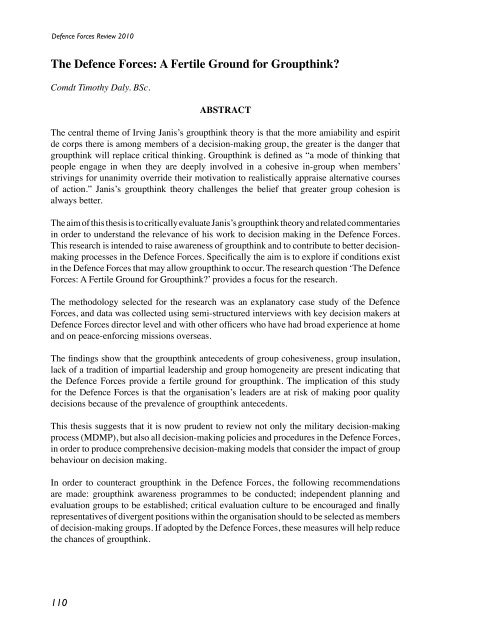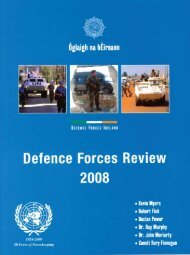Defence Forces Review 2010
Defence Forces Review 2010
Defence Forces Review 2010
Create successful ePaper yourself
Turn your PDF publications into a flip-book with our unique Google optimized e-Paper software.
<strong>Defence</strong> <strong>Forces</strong> <strong>Review</strong> <strong>2010</strong>The <strong>Defence</strong> <strong>Forces</strong>: A Fertile Ground for Groupthink?Comdt Timothy Daly. BSc.ABSTRACTThe central theme of Irving Janis’s groupthink theory is that the more amiability and espiritde corps there is among members of a decision-making group, the greater is the danger thatgroupthink will replace critical thinking. Groupthink is defined as “a mode of thinking thatpeople engage in when they are deeply involved in a cohesive in-group when members’strivings for unanimity override their motivation to realistically appraise alternative coursesof action.” Janis’s groupthink theory challenges the belief that greater group cohesion isalways better.The aim of this thesis is to critically evaluate Janis’s groupthink theory and related commentariesin order to understand the relevance of his work to decision making in the <strong>Defence</strong> <strong>Forces</strong>.This research is intended to raise awareness of groupthink and to contribute to better decisionmakingprocesses in the <strong>Defence</strong> <strong>Forces</strong>. Specifically the aim is to explore if conditions existin the <strong>Defence</strong> <strong>Forces</strong> that may allow groupthink to occur. The research question ‘The <strong>Defence</strong><strong>Forces</strong>: A Fertile Ground for Groupthink?’ provides a focus for the research.The methodology selected for the research was an explanatory case study of the <strong>Defence</strong><strong>Forces</strong>, and data was collected using semi-structured interviews with key decision makers at<strong>Defence</strong> <strong>Forces</strong> director level and with other officers who have had broad experience at homeand on peace-enforcing missions overseas.The findings show that the groupthink antecedents of group cohesiveness, group insulation,lack of a tradition of impartial leadership and group homogeneity are present indicating thatthe <strong>Defence</strong> <strong>Forces</strong> provide a fertile ground for groupthink. The implication of this studyfor the <strong>Defence</strong> <strong>Forces</strong> is that the organisation’s leaders are at risk of making poor qualitydecisions because of the prevalence of groupthink antecedents.This thesis suggests that it is now prudent to review not only the military decision-makingprocess (MDMP), but also all decision-making policies and procedures in the <strong>Defence</strong> <strong>Forces</strong>,in order to produce comprehensive decision-making models that consider the impact of groupbehaviour on decision making.In order to counteract groupthink in the <strong>Defence</strong> <strong>Forces</strong>, the following recommendationsare made: groupthink awareness programmes to be conducted; independent planning andevaluation groups to be established; critical evaluation culture to be encouraged and finallyrepresentatives of divergent positions within the organisation should to be selected as membersof decision-making groups. If adopted by the <strong>Defence</strong> <strong>Forces</strong>, these measures will help reducethe chances of groupthink.110
















